The solution to Indian country’s problems is not more federal programs or federal oversight. The key to unlocking Indian country’s potential is greater tribal autonomy. Tribes, like all governments, need the ability to punish criminals, levy taxes, and regulate their lands. Under existing law, tribes lack the sovereignty to exercise these essential governmental functions. Hence, tribes struggle to exercise their right to self-govern.
Although many question tribes’ ability to act as governments, tribes have long histories of self-governance. Indeed, tribes existed as governments long before the United States was formed. Tribes developed laws and institutions to effectively manage their lands, resources, and the people upon them. These Indigenous institutions facilitated transcontinental trade and enabled Indians to enjoy high standards of living.
European arrival upset traditional Indigenous ways. Drastic depopulation brought about by disease and warfare caused immense hardship for tribes. However, tribes seized the opportunities that arose. They formed new alliances and embraced the European items that made their lives easier, such as horses, guns, and metal tools. These European items enabled Indians to resist colonization.
But as time marched on, tribal populations fell to disease as the United States’ population soared. Tribes continued to fight to preserve their lands, cultures, and governments. In treaties, tribes agreed to exchange their land for guarantees from the United States. Tribes kept their end of the bargain. The United States has seldom honored its word.
Consequently, reservations have been mired in poverty for over a century. While federal policy has oscillated between tribal destruction and empowerment, excessive federal regulation of tribal affairs has remained constant. Tribes endure levels of federal regulation that exist nowhere else in the United States. Moreover, these regulations cannot be justified by the Constitution or logic. These regulations serve no purpose other than impeding tribal autonomy.
Tribes deserve the right to govern their lands as nations. This right was secured in numerous treaties, and in the words of Justice Hugo Black, “Great nations, like great men, should keep their word.”Footnote 1

